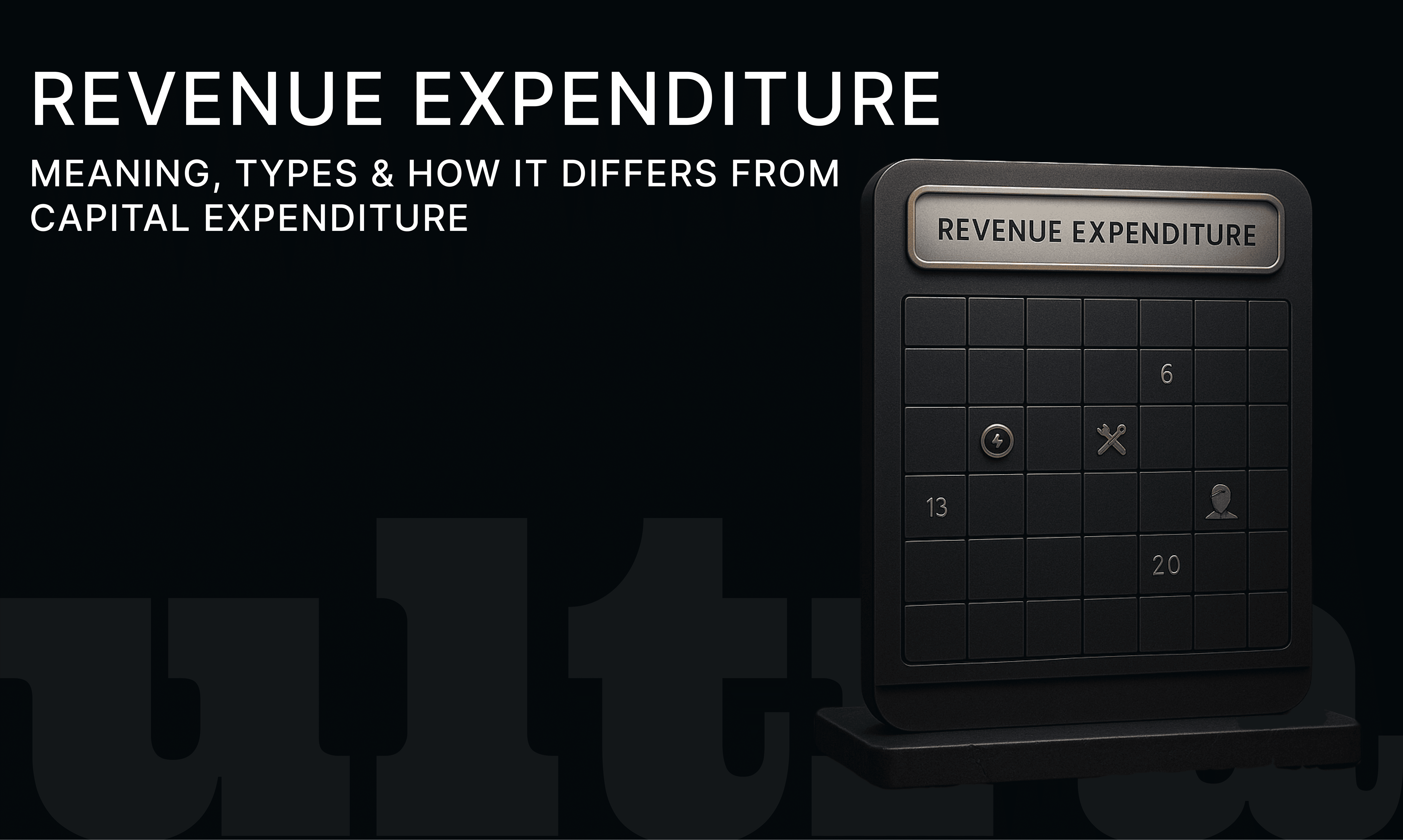Revenue Expenditure: Meaning, Types & How It Differs from Capital Expenditure
02 July 2025 · Sachin Gadekar
A complete guide by Ultra on what is revenue expenditure, its meaning, how it works, its types, examples, and its difference from capital expenditure.

What is Revenue Expenditure?
Introduction
For any business or individual looking to manage finances smartly, understanding revenue expenditure is crucial. It is a common term in accounting, yet many confuse it with capital expenditure. At Ultra, we aim to help you decode financial terms so you can make informed investment and budgeting decisions.
In this article, let’s break down what is revenue expenditure, its meaning, types, real-life examples, deferred revenue expenditure, and how it is different from capital expenditure.
Revenue expenditure refers to the routine expenses a business incurs in its day-to-day operations to keep the business running smoothly. These expenses are short-term in nature and do not result in the creation of any asset.
Revenue expenditure meaning:
It is the cost that is necessary for maintaining and operating fixed assets to earn revenue during the current accounting year.
Key Features of Revenue Expenditure
Recurring in Nature: It occurs regularly such as monthly or annually.
No Asset Creation: It does not result in acquiring or adding to the value of fixed assets.
Charged to Profit & Loss Account: These expenses are fully written off in the year in which they are incurred.
Required for Day-to-Day Operations: Without these expenses, daily business activities may come to a halt.
Examples of Revenue Expenditure
Here are some common examples:
Salaries and wages paid to employees
Rent paid for office or factory premises
Routine repairs and maintenance
Electricity and water bills
Advertising and marketing expenses
Office stationery
Insurance premium
Difference Between Capital Expenditure and Revenue Expenditure
| Basis | Revenue Expenditure | Capital Expenditure |
|---|---|---|
| Definition | Expenses for daily operations and maintenance | Expenses for acquiring or upgrading fixed assets |
| Nature | Recurring | Non-recurring |
| Benefit | Short-term (current accounting year) | Long-term (many years) |
| Asset Creation | No | Yes |
| Accounting | Charged fully to Profit & Loss Account | Capitalized and depreciated over time |
| Examples | Rent, wages, repairs | Buying machinery, building, vehicles |
What is Deferred Revenue Expenditure?
Sometimes, an expense may be of revenue nature but its benefit is spread over multiple accounting years. Such expenditure is known as Deferred Revenue Expenditure.
Deferred revenue expenditure meaning:
It is a revenue expense whose benefit extends beyond the current financial year. So instead of charging it fully in one year, it is written off in parts over a few years.
Examples of Deferred Revenue Expenditure:
Heavy advertising campaigns for a product launch
Huge preliminary expenses in setting up a business
Major repairs or overhauling of machinery which increases its working life
For instance, if a company spends ₹10 lakh on a massive marketing campaign whose benefit will be enjoyed for 5 years, it can treat this as deferred revenue expenditure and write off ₹2 lakh every year.
Why is Revenue Expenditure Important?
Revenue expenditure is vital for the regular functioning of a business. If a company cuts corners on essential operating expenses like maintenance or employee salaries, it risks hampering its productivity, which can lead to lower revenues.
For investors too, analysing revenue expenditure is important to understand whether a company is spending wisely to maintain its operations without overspending.
How is Revenue Expenditure Recorded in Accounts?
All revenue expenditures are recorded in the Profit & Loss Account of the same accounting year in which they are incurred. Unlike capital expenses, these do not appear on the balance sheet as assets.
Revenue Expenditure vs Deferred Revenue Expenditure
While both are revenue in nature, the difference is that normal revenue expenditure is written off entirely in the same year, while deferred revenue expenditure is spread across multiple years due to its extended benefits.
FAQs on Revenue Expenditure
Q1: What is revenue expenditure?
A: Revenue expenditure is the routine expense a business incurs for its daily operations, like rent, wages, or maintenance.
Q2: What is the difference between capital expenditure and revenue expenditure?
A: Capital expenditure creates or adds value to an asset and provides long-term benefit, whereas revenue expenditure is for daily operations and offers short-term benefit.
Q3: What is deferred revenue expenditure?
A: Deferred revenue expenditure is an expense of revenue nature whose benefits last for multiple years, so it is written off gradually.
Q4: Is depreciation revenue expenditure?
A: Depreciation is treated as a revenue expense because it is charged annually to account for wear and tear of fixed assets.
Q5: Why is revenue expenditure important for a business?
A: It ensures that day-to-day operations run smoothly, helping a business generate its routine income.
Conclusion
Understanding revenue expenditure helps businesses and individuals keep their finances transparent and compliant. It is a key part of maintaining daily operations and keeping the business machinery running smoothly. Knowing how to distinguish it from capital expenditure and deferred revenue expenditure is equally important for accurate accounting and better financial decisions.
At Ultra, our mission is to empower you with financial knowledge and investment opportunities that grow your wealth wisely. Explore more such guides and smart investment options on Ultra.